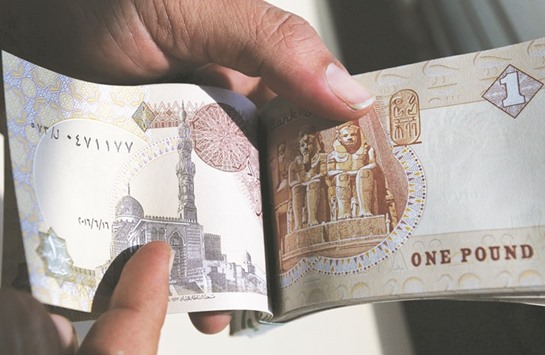A steadily rising pound and falling government bond yields suggest Egypt’s financial markets may be turning the corner after decisive action by the central bank to crush a dollar black market.
The pound rose sharply to 16.6 per dollar yesterday, its strongest in 13 weeks and well above a post-flotation low of 19.8 hit on December 21.
The central bank floated the currency and raised base interest rates by 3% in early November, encouraging the International Monetary Fund to agree a three-year $12bn funding deal later that month.
Since then the black market – which had been a disincentive for people to channel foreign currency through the banking system – has shrunk dramatically.
Dollar inflows at banks have also increased as foreign investors, scared off by a revolution in 2011 that ushered in an era of instability, have begun to return, while dollar remittances from Egyptians living abroad have risen sharply.
“(Remittances)...used to be diverted into the black market but now they have returned to the banking system,” said one Cairo-based banker about the increased dollar inflows.
Total inflows into the Egyptian banking system have reached $12.3bn since the pound was floated, state news agency MENA said on Monday.
The day-to-day economy, however, remains in the doldrums, with record rates of inflation triggered by the pound float further eating into the purchasing power of ordinary Egyptians already suffering the effects of years of economic and political turmoil.
Core inflation hit its highest in more than a decade in January at 30.86%.
The rising prices have also boosted dollar liquidity, with demand for the currency from importers falling as many Egyptian consumers have where possible switched from foreign products to cheaper locally made ones.
In an interview with broadcaster CBC late on Monday, Finance Minister Amr El Garhy forecasting a decline in inflation, saying he expected it to have reached its peak in December and January.
IMF managing director Christine Lagarde said on Monday that Egypt was making good progress and its currency might be ending its transition phase and stabilising.
As confidence increases in the Egyptian economy, foreign investors are also moving back into Egyptian government debt, pushing yields aggressively lower over the past two weeks.
“We have seen around $500mn of new investments into the bourse and around $2bn in the local debt market (since the float),” Deputy Finance Minister Ahmed Kouchouk told CBC. Also speaking to CBC, Finance Minister Amr El Garhy said investment in Egyptian treasuries had increased to around 44bn pounds from around 15bn pounds in January.
“This means that there is confidence in the economic reforms...and that people now see that the risks in Egypt are starting to be limited,” he said.

A man counts Egyptian banknotes outside a bank in Cairo. The pound rose sharply to 16.6 per dollar yesterday, its strongest in 13 weeks and well above a post-flotation low of 19.8 hit on December 21.
